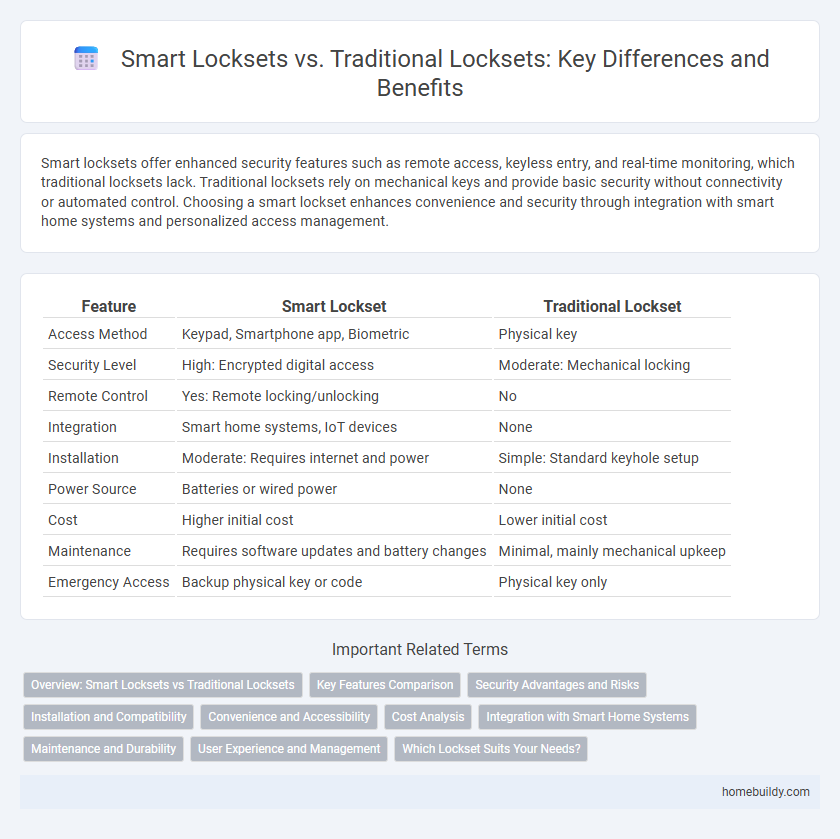Smart locksets offer enhanced security features such as remote access, keyless entry, and real-time monitoring, which traditional locksets lack. Traditional locksets rely on mechanical keys and provide basic security without connectivity or automated control. Choosing a smart lockset enhances convenience and security through integration with smart home systems and personalized access management.
Table of Comparison
| Feature | Smart Lockset | Traditional Lockset |
|---|---|---|
| Access Method | Keypad, Smartphone app, Biometric | Physical key |
| Security Level | High: Encrypted digital access | Moderate: Mechanical locking |
| Remote Control | Yes: Remote locking/unlocking | No |
| Integration | Smart home systems, IoT devices | None |
| Installation | Moderate: Requires internet and power | Simple: Standard keyhole setup |
| Power Source | Batteries or wired power | None |
| Cost | Higher initial cost | Lower initial cost |
| Maintenance | Requires software updates and battery changes | Minimal, mainly mechanical upkeep |
| Emergency Access | Backup physical key or code | Physical key only |
Overview: Smart Locksets vs Traditional Locksets
Smart locksets offer keyless entry, remote access, and integration with home automation systems, providing enhanced convenience and security compared to traditional locksets. Traditional locksets rely on mechanical keys and manual locking mechanisms, which can be more vulnerable to losing keys or picking. The choice between smart and traditional locksets depends on user preference for technology, security features, and ease of use.
Key Features Comparison
Smart locksets offer keyless entry through features like biometric recognition, remote access via smartphone apps, and real-time security alerts, enhancing convenience and security. Traditional locksets rely on mechanical keys and manual unlocking, providing simplicity but lacking advanced access control and monitoring capabilities. Integration with home automation systems and customizable user permissions are distinctive advantages of smart locksets compared to conventional designs.
Security Advantages and Risks
Smart locksets enhance security by integrating advanced features such as biometric authentication, remote access control, and real-time alerts, reducing the risk of unauthorized entry compared to traditional locksets reliant on physical keys. Traditional locksets are vulnerable to common threats like lock picking and key duplication, while smart locksets face risks related to cyberattacks and software vulnerabilities, necessitating regular firmware updates and robust encryption protocols. The blend of mechanical security with digital safeguards in smart locksets offers superior protection, though users must remain vigilant about potential hacking risks to fully benefit from enhanced security advantages.
Installation and Compatibility
Smart locksets typically require more complex installation involving Wi-Fi or Bluetooth configuration and often need compatible door frames and power sources. Traditional locksets feature straightforward mechanical installation compatible with most standard doors without the need for electronic components. Compatibility challenges arise with smart locksets when retrofitting older doors, whereas traditional locksets offer universal fit and easy replacement.
Convenience and Accessibility
Smart locksets provide enhanced convenience and accessibility by enabling keyless entry through smartphones, biometric authentication, or PIN codes, eliminating the need for physical keys. Traditional locksets rely on mechanical keys, which can be lost or stolen, limiting access control and flexibility. Smart lock technology also supports remote management, allowing users to grant or revoke access instantly from anywhere.
Cost Analysis
Smart locksets typically have higher upfront costs, ranging from $100 to $300, compared to traditional locksets that generally cost between $20 and $60. Installation expenses for smart locksets can also be higher due to the need for professional setup and integration with home automation systems. Over time, smart locksets may offer cost savings through enhanced security features and remote access, potentially reducing expenses related to lost keys or lockouts.
Integration with Smart Home Systems
Smart locksets offer seamless integration with smart home systems, enabling remote access, real-time monitoring, and automation through platforms like Alexa, Google Home, and Apple HomeKit. Traditional locksets lack connectivity features, limiting security management to physical keys and manual operation. Integration capabilities of smart locksets enhance convenience and elevate home security by allowing users to control locking mechanisms via smartphones and voice commands.
Maintenance and Durability
Smart locksets often require regular software updates and battery replacements to maintain optimal performance, whereas traditional locksets demand periodic lubrication and mechanical part inspections to prevent wear. Durability in traditional locksets generally exceeds that of smart locksets due to their simpler mechanical design, which is less susceptible to electronic failures or environmental factors like moisture. Choosing between the two depends on balancing the convenience of smart technology maintenance with the proven long-term durability of conventional lock hardware.
User Experience and Management
Smart locksets offer enhanced user experience through keyless entry, remote access, and real-time notifications, improving convenience and security management. Traditional locksets rely on physical keys, leading to potential issues with lost keys and limited control over access. Management of smart locksets is streamlined via mobile apps or cloud platforms, enabling easy user access customization and activity tracking.
Which Lockset Suits Your Needs?
Smart locksets offer enhanced security features such as keyless entry, remote access, and real-time monitoring, ideal for tech-savvy homeowners seeking convenience and advanced control. Traditional locksets provide reliable mechanical security with straightforward installation and durability, perfect for users prioritizing simplicity and cost-effectiveness. Assess your lifestyle, security needs, and budget to determine whether the digital advantages of smart locksets or the tried-and-true reliability of traditional locksets best suits your requirements.
Smart lockset vs Traditional lockset Infographic

 homebuildy.com
homebuildy.com